Live Reporting
- There's a question about the support available to self-employed people before support - paid as a lump-sum - arrives in June.Rishi Sunak says although the money will paid paid in one go, there are "multiple avenues of support" as well, including help from councils and plans to defer tax payments.There's also a question about whether telling people to stay at home could have an adverse effect on their mental and physical health.England’s deputy chief medical officer Dr Jenny Harries says the vulnerable who are self-isolating have been given information as to how they can receive mental health support.She adds that with "more free time" because they aren't travelling into work, those working from home may be more able to exercise every day.
- When it comes to testing and concerns it isn't happening fast enough, Dr Jenny Harries says a brand new virus brings brand new problems.She says: "What the public will recognise is it is a brand new event and every single country is ordering the same [tests] at the same time."Many of the items that are used are coming from a single source and international suppliers, who have also been affected [by the virus]."The deputy chief medical officer says there has not been "a lack of forethought in planning unprecedented event".But she also says it is "vitally important" to be sure the tests we are using work.
- When it comes to people who have only just begun working as self-employed, Rishi Sunak says they will look at whatever accounts they have to work out their entitlement.But for the self-employed the government don't know about "there is nothing we can do", he says, telling them to look at Universal Credit.On tax, Mr Sunak says he wants to make a "broader point rather than be too specific about future tax policy".He says there is "currently an inconsistency" between what the employed and self-employed pay, despite the actions taken "treating them the same".The chancellor adds: "It does throw into light the question of inconsistency and if that is fair."
- The BBC's Laura Kuenssberg also says she has been inundated with messages from people who do not feel safe at work.The deputy chief medical officer, Jenny Harries, says the majority of employers have been "extraordinarily supportive" to workers.But she calls on others to "stick to normal principles of workplace health".Dr Harries will not predict the exact timing of when she thinks the virus will peak.She says we are "only just starting to see a bite" from social distancing measures, so it is "too early" to say.She adds: "We are looking for change in the slope, rather than very steep... a more gentle [growth]."But we must not take our foot off pedal and in the last few days the public has understood this is very serious and their actions will save lives."
- The BBC's Laura Kuenssberg asks what will happen to people not covered by the scheme.Rishi Sunak says it will cover 95% of people who make the majority of their wages through being self-employed.He says the last 5% have average incomes of £200,000, adding: "It is a very generous scheme and treats them with same parity as the employed."
- Mr Sunak says government support for the self-employed constitutes an "unprecedented level of support".He says ministers have worked to make sure it is "targeted at those who need it the most".However, he also has a warning that the government will not be able to “protect every single job or protect every single business".
- Mr Sunak says the scheme will only be open to those who are already self-employed and have a self-assessment tax return for 2019.It will apply to those with trading profits up to £50,000 a year, he adds.He says 95% of those who are majority self-employed will benefit.He says he hopes people will be able to "access" the scheme "no later than June".
- The latest figures from Italy have just been released: 662 people died from coronavirus in the past 24 hours, bringing the total to 8,165. There are now 80,539 confirmed cases of Covid-19 in the country,
- Rishi Sunak says self-employed people facing financial difficulties will be able to have 80% of their monthly wages covered by the government.He says this will be calculated using average monthly profits over last three financial years.He says support will be capped at £2,500 per month, and will initially last three months.
- Chancellor Rishi Sunak has begun the daily press conference from the UK government.He is joined by deputy chief medical officer Jenny Harries.Mr Sunak begins by saying he would announce "the next step in the economic fight" against the pandemic with help for the self-employed.
- As we await news from the chancellor about help for the self-employed, one group who are particularly nervous are supply teachers.Do they count as employees, because they have tax deducted from their pay at the source, and therefore could claim 80% of their wages from the government?Probably not, they fear, as they are hired ad-hoc and often work through agencies.But they are not self-employed, either.Speaking to those who represent teachers, they make the point that supply teachers could prove crucial in the coming weeks and months in the effort to keep schools open for the children of key workers, as staff teachers take time off with the virus.They are very alive to this issue - and they are pressing the government for clarity.
- New York Governor Andrew Cuomo said he was “disappointed” with the $2tn (£1.6tn) aid bill passed by the US Senate on Wednesday.“The congressional action, in my opinion, simply failed to address the governmental need,” Cuomo said at his daily press briefing.“I find it irresponsible, I find it reckless.”New York state remains the epicentre of the outbreak in the US.As of Thursday, 37,258 people in New York have been diagnosed with Covid-19 - accounting for more than half the cases throughout the country. At least 385 people in the state have died from the virus.The aid package - the largest economic stimulus bill in US history - includes direct payments of $1,200 to most American adults and aid to help small businesses pay workers.New York received $5bn from the aid package, Cuomo said, as the state faces $10bn-$15bn in revenue loss as a result of coronavirus.Amid country-wide shortages of medical supplies, Cuomo said New York had enough personal protective equipment for the immediate future - around 1-2 weeks.But that any “realistic” scenario will “overwhelm hospitals”, he said. “You cannot get the curve down low enough.”
- New emergency legislation in the UK says no one in the country is allowed to leave their home “without reasonable excuse”.Several new activities which are permitted have been added to a list outlined by the Prime Minister on Monday.They include moving house, fulfilling legal obligations, accessing critical public services and to escape injury, illness or the risk of harm.There is no limit in the legislation on the number of times each day a person may leave their premises.Police now have powers to “direct” and “remove” people to their homes and use “reasonable force” to do so, if they’re not complying with the new laws.Fixed penalty fines can be imposed on people who flout the rules on being at home or gathering in groups of three or more by community support officers, local authority wardens, as well as police officers.The legislation says prosecutions may be brought.The measures - which last six months - must be reviewed every three weeks.
- We will soon be hearing from the UK government about its latest measures to tackle the coronavirus outbreak.But what is the current situation in the country?
- The number of deaths in the UK has risen to 465, out of 9,500 confirmed cases. An update to the UK-wide figures is expected later
- New laws come into force to give police more powers to fine people who do not stick to isolation measures
- About 170 Britons stranded in Peru have returned to the UK on the first government-chartered flight
- The government extends its target for volunteers to help the NHS to 750,000, after an "amazing" 560,000 people signed up since Tuesday
- People in the UK are being asked to stand at their windows to applaud NHS workers at 20:00 GMT
- It is that time of day again when we are soon expecting to hear the daily update from the UK government.Today’s press conference will take place at 17:00 GMT and be led by Chancellor Rishi Sunak, with details on how he plans to help the self-employed during the coronavirus outbreak.It comes after mounting pressure on the government to help freelance workers and contractors in the same way they are helping the employed.We will bring you all the updates as they happen and you can watch the press conference on BBC One and the BBC News channel.
- African states have been stepping up efforts to prevent the spread of coronavirus.Infection rates on the 54-nation continent are still low - 2,700 cases in 46 states.There are fears that the number will rise rapidly because of cross-infections, overwhelming health services on the mainly poor continent.In the latest developments:
- Uganda has banned all public transport with immediate effect, creating fear and panic in the capital, Kampala. The security forces have shutting down businesses in the capital and Kampala's streets are now mainly deserted
- Nigeria, Africa’s most-populous state with an estimated population of 200 million, says it will ban all travel in the country, but has not yet indicated from when
- In Kenya, East Africa’s biggest economy, President Uhuru Kenyatta has announced a night-time curfew from Friday
- Kenya's president has also taken an 80% pay cut, as he prepares the nation for tough economic times - and has urged other officials to follow suit
- Meanwhile, Germany says it will not be paying for six-million face masks it had ordered but had not received after they went missing at an airport in Kenya
- Back in Nigeria the government received a donation, including 100,000 face masks, from Chinese billionaire Jack Ma
- In South Africa, leading evangelist Andy Buchan says he has tested positive for Covid-19, while local media reports that a man who won 7.4m rand ($426,000; £354,000) in the lottery will have to wait until the nationwide lockdown ends to pick up the money. The three-week shut down starts on Friday, and panic-buying is continuing
- The UK government is being accused of putting "Brexit before breathing" by not taking part in an EU scheme to provide ventilators to member states.Despite the UK leaving the bloc in January, the EU invited the country to join in with the project.But a No 10 spokesman today said the UK was "making [its] own efforts".
- Frontline staff at UK children's charities say they are feeding desperate families with food "from their own cupboards" amid the coronavirus epidemic.It comes as the latest official UK figures on child poverty, released today, showed an increase of 100,000 children, to 4.2 million.That is 30% of UK children living below the poverty line (here's more about what counts as poverty).Action for Children says those already struggling are likely to be hit hard by the "economic wave" of this unprecedented health crisis.The charity's director of campaigns, Imran Hussain, said: "In the past week, some families have already got so desperate our frontline staff are feeding them from their own cupboards."And with so many families at breaking point, we've had to launch an appeal fund to help those struggling to pay for basic essentials like food, nappies and utility bills."
- Earlier, we reported the pledge by G20 leaders to inject $5 trillion into the global economy for the fight against the coronavirus outbreak.It comes after the UN Secretary General, António Guterres, called for action from the group, asking for an "immediate global ceasefire in all corners of the world" to "focus together on the true fight of our lives".We have gone through the joint statement from the G20 leaders after their meeting today with a fine-tooth comb, and here's what else you need to know:
- The leaders have "strongly committed to presenting a united front against this common threat"
- They pledge to take "all necessary health measures" to protect people, especially the most vulnerable
- They promise to share research and best practices on the virus and vaccines, and to increase manufacturing capabilities for medical equipment
- The leaders say they will use "all available policy tools to minimise the economic and social damage from the pandemic"
- Finance ministers from the countries and Central Bank governors will work together to develop a G20 action plan on the economy
- They will work together to ensure the flow of trade - especially medicines - isn't disrupted
- They will support developing and the least developed countries - notably countries in Africa and small island states, where health systems and economies may be less able to cope
- They also pledge to provide assistance where necessary to repatriate citizens
- Finally, the G20 leaders say they "stand ready to react promptly and take any further action that may be required"
- People who repeatedly flout new UK rules on social distancing and gathering in groups could face fines up to £960, under a new law.Legislation to give police forces the power to enforce the rules in England specifies the standard fine would be £60, or £30 if paid within two weeks.Those who break the rules a second time would be fined £120, with the charge doubling for every new offence up to the £960 maximum.However, police chiefs have been keen to stress they want to try to enforce the rules through persuasion where possible.On Thursday, Derbyshire Police released a video showing people still making non-essential trips to the Peak District.Police, who used a drone to identify people still visiting the area, called on people to stay at home.

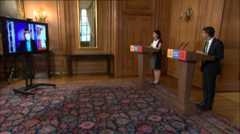
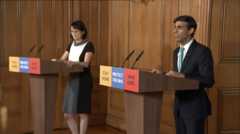


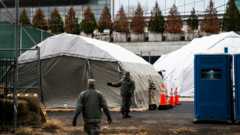

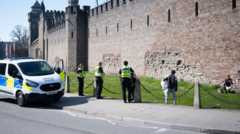
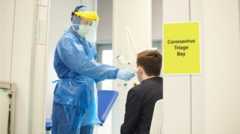
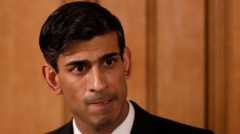
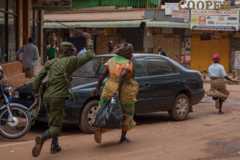
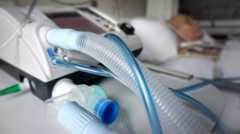
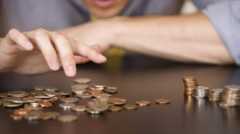
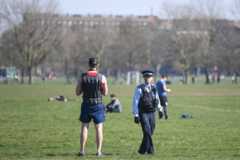
No comments:
Post a Comment